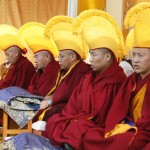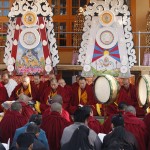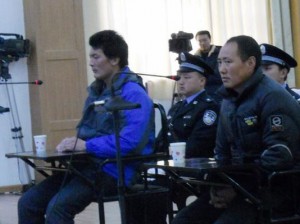 The Tibetan Losar, or New Year, celebration can be traced back to the pre-Buddhist Bon period. It was first a religious festival and later evolved into an annual Buddhist festival, which is believed to have originated during the reign of the ninth king of Tibet. Different regions in Tibet have different practices and their own rituals, although they are all very similar.
The Tibetan Losar, or New Year, celebration can be traced back to the pre-Buddhist Bon period. It was first a religious festival and later evolved into an annual Buddhist festival, which is believed to have originated during the reign of the ninth king of Tibet. Different regions in Tibet have different practices and their own rituals, although they are all very similar.
Losar is based on the Tibetan calendar which is made up of twelve lunar months: the first day of the first month is considered New Year. In fact, Losar begins on the 29th day of the 12th month, when the custom is to make a special noodle dish called “Guthuk” which is made of 9 different ingredients including dried cheese and various grains. Also, dough balls are given out with various ingredients hidden in them such as chilli, salt, wool, rice and coal. The ingredients one finds hidden in one’s dough balls are supposed to be a lighthearted comment on one’s character. The last day of the year is called “Namkhang” and it is a time to clean and prepare for the approaching New Year.
The First day of Losar is called “Lama Losar”; people arise early to place water and offerings on their household shrines and go to the temple and get a blessing from our respected Lama. We visit the nearest temple in our traditional attire, or new clothes, and spend the whole day with our family.
The second day of Losar is called “Gyalpo Losar”, meaning King Losar, because officially the day is reserved for secular gatherings. Before the Chinese invasion His Holiness and his government exchanged greetings with both monastic and lay dignitaries, such as representatives of China, India, Bhutan, Nepal, Mongolia and other foreign visitors. The third day of Losar is called Choekyong Losar. In the early morning we go to pray and make offerings for all sentient beings’ welfare, and for better luck for the whole year; we also hang prayer flags (wind horses) which are considered to bring good luck. Celebrations can go on for 15 days or more but in India it is celebrated for three days; in other countries for maybe as little as one day.
This year, the exile Central Tibetan Government appealed to Tibetans not to celebrate Losar in light of the ongoing crisis inside Tibet, and asked that only the customary religious ritual be performed. The spirit of the Tibetan people has never died, not even under the Chinese regime in Tibet. We hope for a better future and pay our deepest condolences to our brothers and sisters and their brave souls.
Bod Gyalo! (Victory for Tibet! May Tibet live forever!)




 Print
Print Email
Email